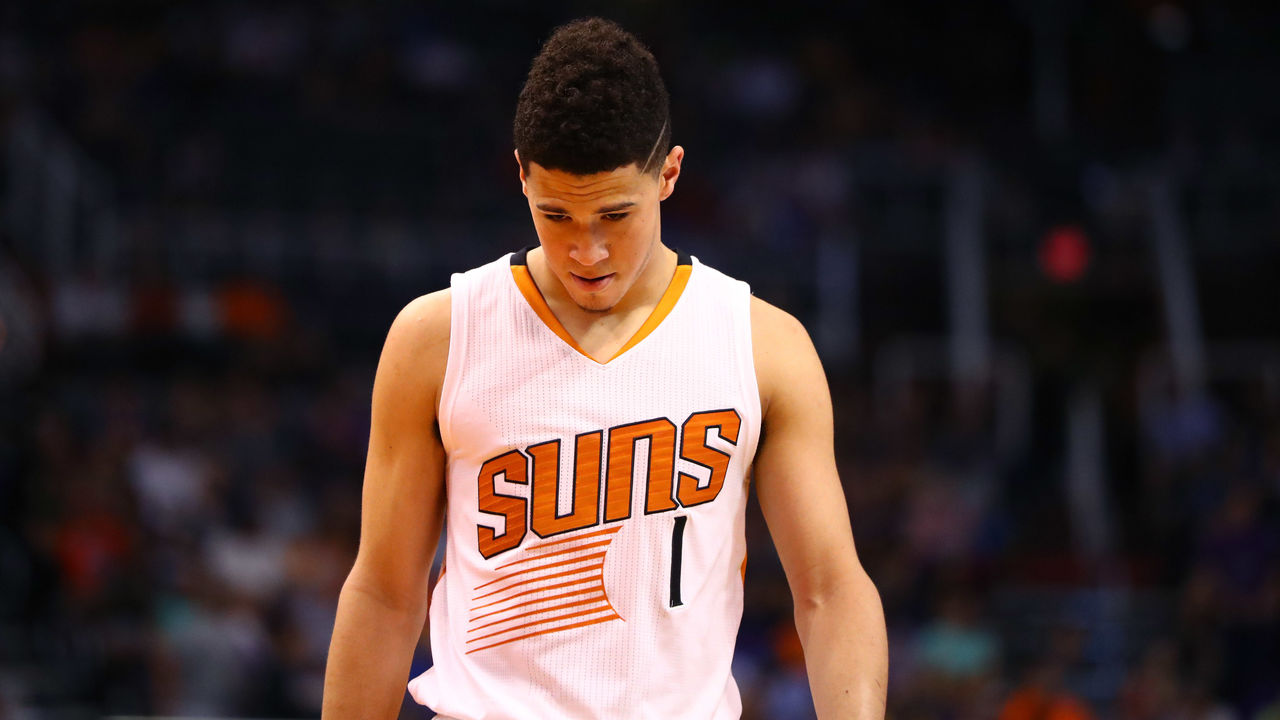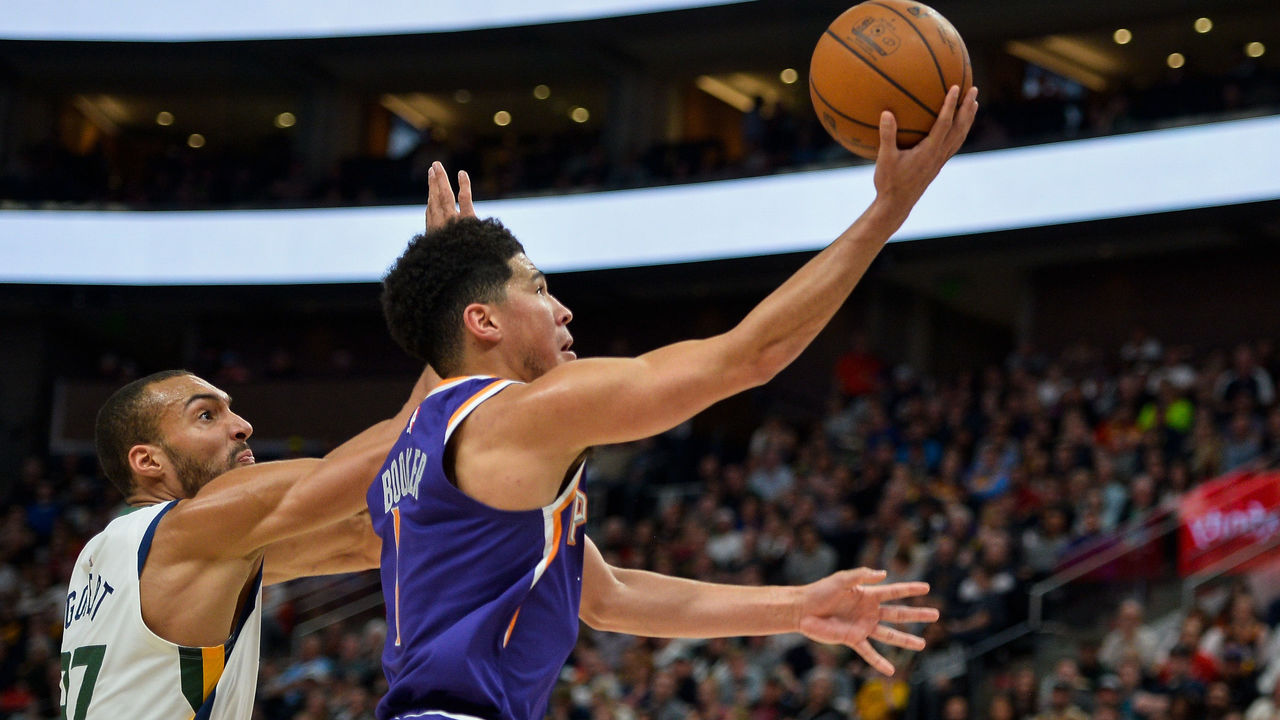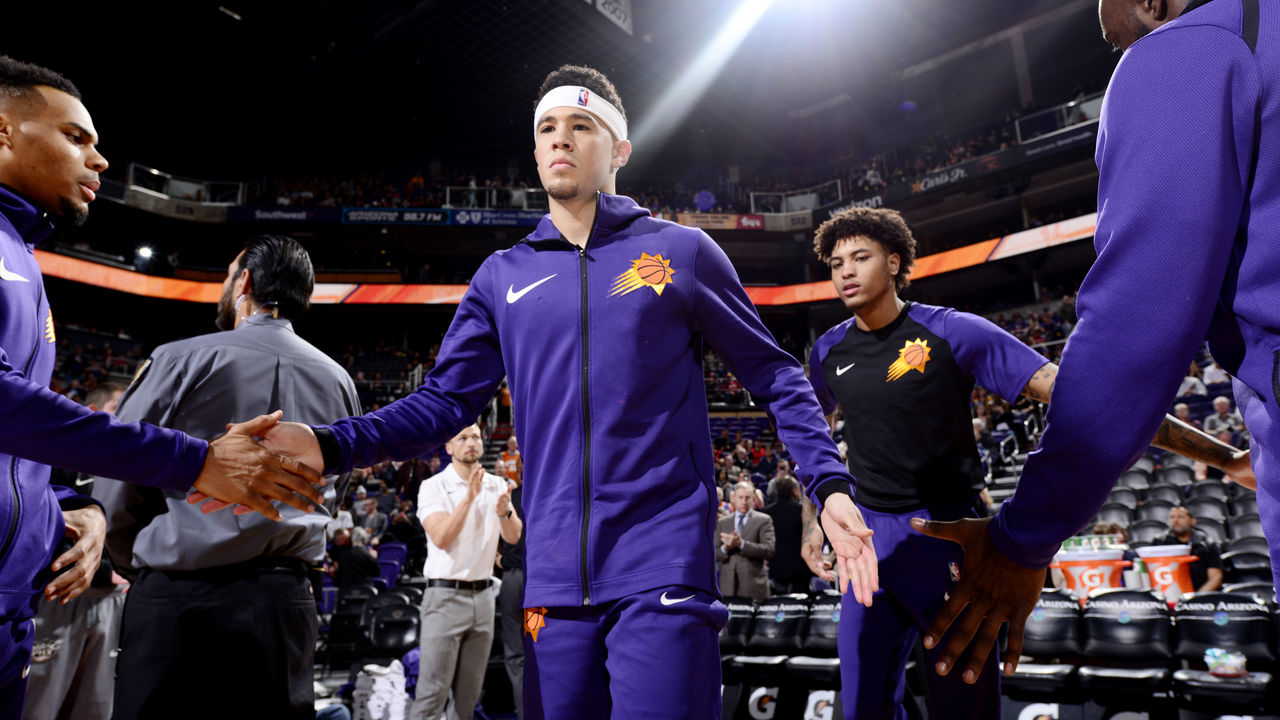Wet like I'm Book: The Suns are bad, but don't you dare blame Devin Booker
There might not be a player in the NBA having a more polarizing season than Phoenix Suns guard Devin Booker. His offensive explosion over the last two games only added to the complexity.
Booker poured in an astonishing 109 points during those two contests versus the Jazz and Wizards, becoming the youngest player ever to record consecutive 50-point performances. For the season, the 22-year-old is averaging 26.5 points, 6.7 assists, and 4.2 rebounds - the type of benchmarks only LeBron James and Oscar Robertson have met at such a young age.
But like all of the accomplishments throughout Booker's four-year NBA career, the latest theatrics came with a caveat. The Suns were blown out by 33 points when Booker scored 59 on Monday, and then lost a close game at home despite Booker's 50 on Wednesday. When you include his 70-point epic two years ago in Boston, which came in a 10-point loss, Booker's name is now attached to a dubious piece of history; he's the first player ever to lose his first three 50-point games.
Losing has become all the Suns know, and Booker's arrival has done nothing to change that.

Forget playing .500 basketball; Booker doesn't even know what .300 ball feels like. Since drafting him 13th overall in 2015, the Suns have won just 26 percent of their games (an 85-237 record). During that time, they've yet to reach the 25-win plateau, and they've never finished higher than 14th in the West or 27th overall.
When the Suns beat the Mavericks on opening night this season, it was Booker's first time being above .500 since Phoenix was 7-6 in November 2015. The longest winning streak he's ever been a part of lasted four games. Meanwhile, the Suns have posted losing streaks of at least 13 games in each of Booker's four seasons, including a franchise-record 17-gamer this year.
That kind of perennial futility leaves a stain on everyone involved, especially when you're seen as the common thread. T.J. Warren is the only other player who's been on the roster throughout this four-year stretch, which has also featured four head coaches and two general managers.
For Booker's detractors, the Suns' failures are partly because of his presence, not in spite of it, and no stat line is going to change that perception. But at this point, the criticism has become somewhat ludicrous.
This week, for example, Phoenix was an almost respectable minus-5 in the 78 combined minutes Booker played against Washington and Utah. But in the 18 minutes he watched from the bench, the Suns were outscored by 31. That's just absurd.

It's likely Booker will never be a two-way monster. His game has flaws, particularly on the defensive end, but there are maybe - maybe - a handful of flawless superstars. The majority of elite NBA players exist in a world where at least semi-competent franchises build rosters with their weaknesses in mind in order to maximize their strengths.
The Suns have failed Booker miserably in that regard - a lot more than he can ever fail them.
Make no mistake, Booker is an offensive talent worth building around. It's one thing for mediocre players to get buckets on a bad team where they're free to let it fly without consequence; the so-called "looters in a riot," as NBA analyst Kenny Smith refers to them. Search the term on Twitter right now, and you'll find Booker is the label's latest victim.
But while the Suns may exist in a state of perpetual chaos, Booker is no looter. His 109 points this week came on just 85 individual possessions (1.28 points per possession), and a sensational 60-47-93 shooting split. The rest of the Suns combined for 103 points on 36 percent shooting during those two games.
And though Booker's 3-point shooting has plummeted to 32.7 percent this season (compared to 36.5 percent over his first three campaigns and 38.3 percent last year), his overall scoring profile remains impressive. Booker owns a slightly better effective field goal percentage (51.6) than big man Joel Embiid despite taking far tougher shots, while his ability to get to the free-throw line allows him to score with a level of efficiency that's uncommon for high-usage guards.
According to NBA.com's play-type data, Booker's actually been more efficient in isolations this season than Portland's Damian Lillard, and more efficient as the ball-handler in pick-and-roll situations than the Mavericks' Luka Doncic and the Raptors' Kyle Lowry, to name a few.
Guards with better than 30 percent usage and 58 percent true shooting in the last 10 years
| Player | Season(s) |
|---|---|
| James Harden | 5 (including 2018-19) |
| Stephen Curry | 4 (including 2018-19) |
| Damian Lillard | 2 |
| Kyrie Irving | 2 |
| Dwyane Wade | 1 (2010-11) |
| Isaiah Thomas | 1 (2016-17) |
| Devin Booker | 1 (2018-19) |
You simply can't score as prolifically and efficiently as Booker does without having a gift for putting the ball in the bucket. That he's doing it with so little help, and while commanding so much of the defense's attention, is a testament to those abilities, not a knock against them.
If the Suns ever acquire a reliable point guard to take some of the on-ball burden from Booker, perhaps we'll also see him flourish as a spot-up threat or as a catch-and-shoot weapon coming off screens. Without such a teammate, though, Booker's been forced to develop as a playmaker. He still turns the ball over too often, but he ranks 14th in the league with 6.7 assists per game - an impressive number considering his only reliable offensive outlet is rookie big man Deandre Ayton.
Overall, despite being dead last in 3-point shooting (for the second straight year), Phoenix scores 107.6 points per 100 possessions when Booker's on the court. Sure, that would place the Suns 21st in offensive efficiency this season, but when Booker sits, the team's dismal mark of 97.2 points per 100 possessions would put it in the company of the dreadful 2014-15 Sixers (94.8 per 100 possessions).

Perhaps the Suns' path to success with Booker in the fold is landing a two-way star (or hoping Ayton becomes that guy) who establishes Booker as a clear-cut No. 2 option.
Regardless, plenty of other teams have made it work - at least contending to some degree - with a player like Booker soaking up the majority of offensive possessions. There's no rule that states franchises led by offense-first guards must be doomed to wander in the 55-60 loss wilderness for eternity. That's on the Suns as an organization, not Booker.
Phoenix is in line for another high pick in what's expected to be a transcendent draft class at the top. The team also has financial flexibility and two young studs in Booker and Ayton. Beyond that, it must add shooting, defensive problem-solvers (Mikal Bridges is a good start), and ideally a point guard.
That might not allow them to build a contender right away, but the Suns can at least try surrounding Booker with a functional NBA roster and seeing where he takes it, rather than watching another awesome offensive season written off by many as simply the work of a con man.
HEADLINES
- Report: Pistons, Hawks, Raptors expected to be suitors for AD
- Report: Warriors to discuss moving Kuminga when trade eligible
- NBA Cup quarterfinals: Heat-Magic, Knicks-Raptors, Suns-Thunder, Spurs-Lakers
- Pelicans' Queen becomes 1st rookie center with 30-point triple-double
- Projecting rosters for USA vs. World All-Star Game